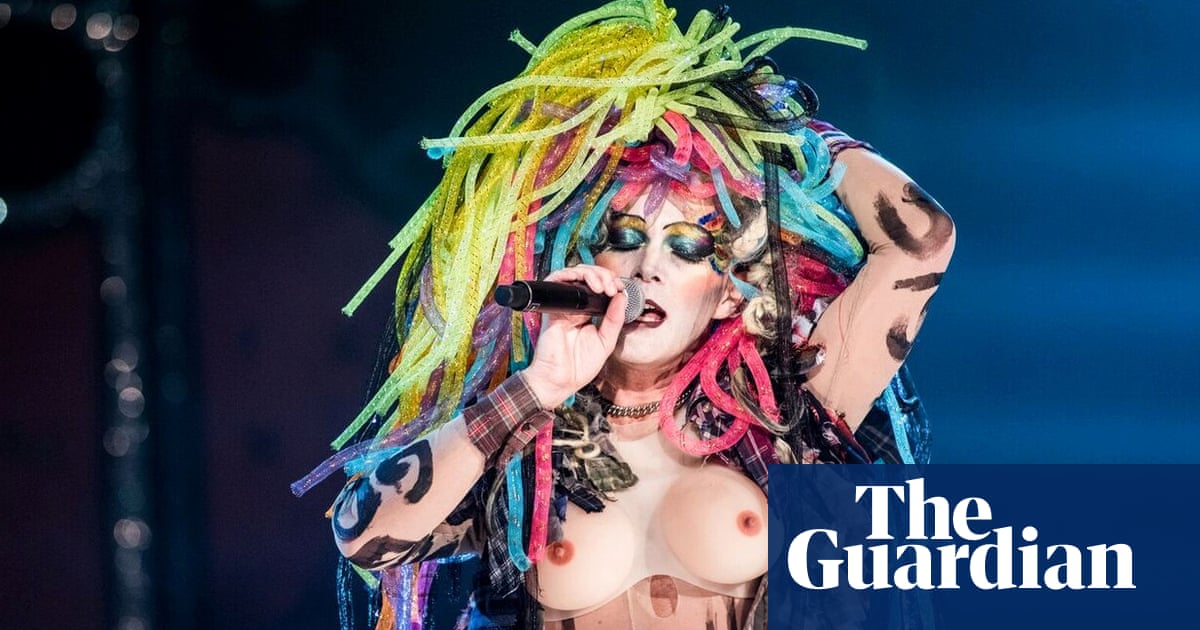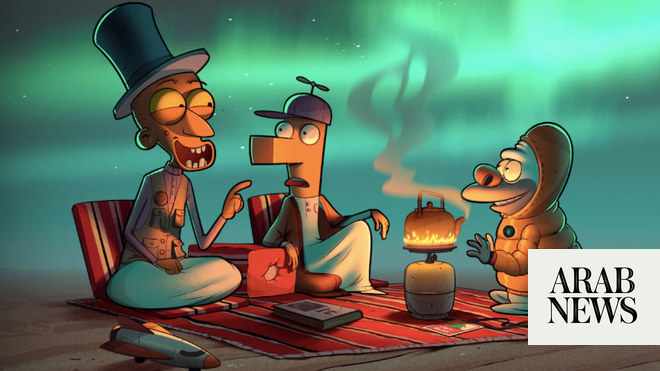
Taylor Mac’s queer cohort have hatched a plan for their next concert. “We’re doing a reverse conversion therapy,” promises the US performance artist, making a grabbing motion with one hand: “We’re trying to make everybody more queer than when they entered.”
The last time Mac played in Australia, it was in the career-defining ultramarathon spectacular 24-Decade History of Popular Music, in 2017. Across 246 songs and 24 hours (split over four nights in Melbourne), Mac changed into a new elaborate costume as each decade ticked over and invited dozens of guest performers to join the stage; the audience, meanwhile, was corralled into participation, re-enacting everything from the civil war to a gay prom.
The show was received rapturously. The Guardian called it “everything” in 2016, when it was performed in Brooklyn without breaks, and awarded it another five-star review the following year; the New York Times critic Wesley Morris said it was “one of the greatest experiences of my life”.
Mac’s preferred pronouns are judy/judy’s (Mac wanted a pronoun that was “fun and that immediately emasculates you”) and judy laughs heartily and often over video call, fluttering orange fingernails that match the wall of the Gramercy Park apartment. Mac is speaking ahead of a trip to Australia for the world premiere of Bark of Millions: a brand new, all-star, four-hour show created by Mac and collaborator Matt Ray, which will open at the Sydney Opera House in October.
Mac and “queer brother” Ray have been collaborators since their 2009 play, The Lily’s Revenge, a response to anti-same sex marriage rhetoric. United in the belief that isolation – as individuals or in tribes – triggers anger in the world, their mission is to open up the queer community to outsiders. That was certainly the goal of the 24-Decade show, which was the subject of a recent HBO documentary; during that performance, one musician left the stage each hour to convey the devastating loss of the Aids crisis – until Mac was left to perform the final hour alone.
But something key was missing, Mac says now. “We sang 240 songs” – pulled largely from America’s songbook – “and hardly any of them were about queer people, unless it was in a derogatory way. So there’s obviously this deficit of songs specifically for queer people. So I said, ‘Let’s just do a big song drop’.”
Sign up for the fun stuff with our rundown of must-reads, pop culture and tips for the weekend, every Saturday morning
Hence Bark of Millions. Born during the pandemic, Mac would send lyrics and Ray would send back music, with the pair together creating 54 new songs: one for each year since the 1969 queer uprising at New York’s Stonewall tavern, and each celebrating a queer individual – some famous, some unknown. The title nods to both a mythological boat from ancient Egyptian times as well as the early deity Atum, whose male and female duality Mac reads as “genderqueer”. (The full show’s not “woo” or spiritually weird, Mac promises.)
After a few smaller concerts in New York in June, Bark of Millions will make its full world premiere at the Sydney Opera House featuring 21 performers, including 13 singers such as Australia’s Mama Alto and the British-Nigerian Le Gateau Chocolat. Twenty performers are being brought from overseas, with the designer behind the 24-Decade show, Machine Dazzle (AKA Matthew Flower), again creating all the costumes – this time for the musicians too. (Mac makes an only-half-joking appeal to any rich philanthropists among Guardian readers who may wish to offer financial aid.) The plan is to take the show back to the US in February; they’ve written a 55th song to be added next year.
As for the show itself: “We call it an opera but there’s no plot,” says Mac. “It’s just song after song after song, so it’s like this trance. That’s why we call it a ‘parade trance extravaganza’.” Eyes widened and hands cartwheeling, judy laughs: “We’re just trying to hypnotise everybody to be more queer.”
At the 24-Decade show, audiences were invited to dance, slow-motion mime, flirt with strangers and fling ping pong balls – symbolic rituals for fighting queerphobia and ageism. This time around, they will only have to listen, laugh, perhaps cry – and certainly think. “[We want to] share an expansive world, where we’re paying attention to how we affect the planet and how we affect each other.”
For Mac, these topics took a dangerous turn the week we speak. Parts of the world are opening up for the queer community – but there are now reprisals. Speaking over video call, judy sighs, and looks to the ceiling then back at the camera, with hand on chest.
“A friend of mine, his best friend was just murdered yesterday in Brooklyn for voguing,” Mac says, speaking of 28-year-old dancer O’Shea Sibley, killed earlier this month. “They were dancing at a gas station.
“There’s a level of freedom of expression now that I didn’t have growing up, and a backlash as a result of that. So, I think queer people have more power in the US than they have had historically, and more visibility, and there are consequences to that because there are people who just want to harm us.
“I think the reason people are homophobic and there are all these trans laws and laws against drag queens performing – and they want to put people like me in prison for performing for children – is because we’re making money now. They see that we’re happier, we have more visibility … and they’re pretty angry about it, so they’re coming for us.”
I suggest there’s bravery and generosity to what judy does, opening up the queer community and inviting audiences in. “I’m not sure if it’s generosity; I think it’s survival. I’m trying to make the whole world ‘get it’ so that I don’t have to watch my back.”
The songs in Bark of Millions will honour those who epitomise queer trailblazing, such as Mother Flawless Sabrina: star of 1968 film The Queen, who was creating drag extravaganzas in the 1950s and who become legendary “drag mother” to Mac and others. (Mac, who turns 50 soon, isn’t ready for that title: “The younger generation, they call me auntie and suddenly I’m supposed to be the drag mother,” judy laughs. “[I say], ‘No, queen, I’m your peer, get over it.”)
There’s also a song for the trans activist Marsha P Johnson; another for civil rights activist Bayard Rustin; one for experimental playwright Ethel Eichelberger; and another for surrealist pioneer Claude Cahun – as well as songs for many hardly known at all.
Mac’s team were inspired, in part, by the US lesbian civil rights organisation Daughters of Bilitis: “One of their goals was to add to the ‘living library of the deviant theme’, and so this big song dump adds to the living library all these queer songs,” says Mac.
“The process was so much about trying to stay connected to our people and dream about what would gather us all together again.
“Now it’s turned into a beautiful kind of queer meditation that everybody is invited to – and you don’t have to be queer to get it.”












